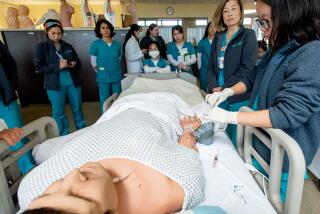Nurses Across State Cash In on Shortage
- Share via
When Danielle Ortiz was finishing up nursing classes at Victor Valley College last May, she had one ambitious goal: to land a job as a labor and delivery nurse, a specialty slot not often handed to green college graduates.
Luckily for her, she was entering a booming nursing job market in a state with one of the worst nursing shortages in the country. So with very little work experience, she easily landed a job in the field of her dreams--and collected a $2,000 sign-on bonus to boot.
“They don’t usually take people right out of college into certain specialties,” said Ortiz, 23. “But because of the shortage, they’re willing to try anything.”
This is the flip side of the nursing shortage: a health care industry pulling out all the stops to recruit and educate nurses. California hospitals are now offering sign-on bonuses of as much as $15,000, as well as paying moving expenses, tuition for baccalaureates and master’s degrees and contributions to 401(k) plans.
“The competitive environment for hospitals hiring nurses is unbelievable,” said Jan Emerson, spokeswoman for the California Healthcare Assn., a hospital trade group.
NurseWeek, a California publication for nurses, is replete with ads from hospitals offering hiring bonuses. In certain locations and specialties especially short of nurses, signing on can add up to big bucks.
Recruiters at Redding Medical Center in Northern California offer $15,000 to nurses with experience in critical care, cardiovascular care or intensive care.
“It depends on the type of specialty you’re trying to recruit,” said Carolyn Helfenstein, a Redding Medical spokeswoman. “[Nurses] might not be as readily available as they would be in a metropolitan area.”
Natividad Medical Center in Salinas offers $5,000 sign-on bonuses for certain specialty positions because they require more training. Since the cost of living in Monterey County is high, nurses get an extra boost.
“It is hard to get qualified nurses to come to our facility,” said Janine Bouyea, acting human resources administrator at Natividad. “We offer a sign-on bonus to woo them.”
The hospital also offers to pay up to $5,000 in moving expenses and full tuition if nurses go back to school in Monterey County.
Some hospitals say they are able to recruit without offering signing bonuses. “We’ve never had to pay people up front to come in the door,” said Janice Beuhler, director of work force planning at Cedars-Sinai Medical Center and president of the Southern California Assn. of Healthcare Recruiters.
Beuhler said hiring bonuses sometimes cause resentment among nurses already on staff.
“It doesn’t sit well for a nurse who’s been with us for five years when someone brand-new walks in and gets $5,000,” she said.
It also annoys nurses when new hires come in, take the signing bonus, benefit from free specialty training, complete their contractual stints of a couple years and leave for hospitals offering yet another bonus and a larger salary.
Instead, Cedars pays for training programs and an on-site bachelor’s and master’s program affiliated with Cal State L.A.
Hiring incentives can sometimes even frustrate the new hires themselves. Earlier this month, Frederick Brown, 36, quit his job as an emergency room nurse at St. Luke’s Medical Center in San Francisco because he believed that, by taking a bonus and a free apartment for three months, he ended up beholden to the hospital. He thought he had little say in which shifts he worked and when.
“Any time an industry is offering all this stuff to you, there has to be a catch to it,” said Brown, who now works as a nurse in Kansas City.
Public hospitals don’t offer the same perks as private facilities, but they do what they can. Los Angeles County facilities, for example, offer all nurses 401(k) plans, specialty training and scholarships, said Debi Popkins, director of nurse recruitment for county hospitals and public health programs. These may not be fancy, she said, but they help nurses who want to make a career at county hospitals, she said.
“The benefit is not always on the front end,” she said. “We know you’re a new nurse, but we want you to grow professionally.... Sometimes there’s more of a retention incentive than a recruitment incentive.”
Some hospitals go right to the source of new nurses and offer financial support.
To hospital administrators, it makes practical sense to donate money for faculty salaries at local nursing schools. More instructors mean bigger nursing classes. Bigger nursing classes mean more graduates and a larger pool from which to hire.
Kaiser Permanente, California’s largest HMO, has donated to local schools for more than 10 years and last year donated about $500,000 to schools statewide, said Jim Anderson, a Kaiser spokesman.
All that adds up to more opportunities for nurses.
“Anything that relieves the nursing shortage helps us,” he said.
A year ago, the Healthcare Assn. of Southern California, a regional trade group for hospitals, entered a $100,000 contract with Careforce Consulting Group of South Pasadena to match hospitals with nearby nursing schools. Through almost 25 partnerships in six counties, the group has helped pay for 500 more students to attend school and enter the job market. That amounts to 10% of last year’s nursing graduates in California.
“The hospitals right now are so desperate from a work force standpoint to educate nurses, they’ll do anything to try to [help] their local schools,” said Carol Bradley, the founder of Careforce.
In the end, the nursing shortage must be addressed by nursing schools, public hospitals and private hospitals working together, Popkins said.
“We need to try to form real partnerships so we can attract nurses
More to Read
Sign up for Essential California
The most important California stories and recommendations in your inbox every morning.
You may occasionally receive promotional content from the Los Angeles Times.













